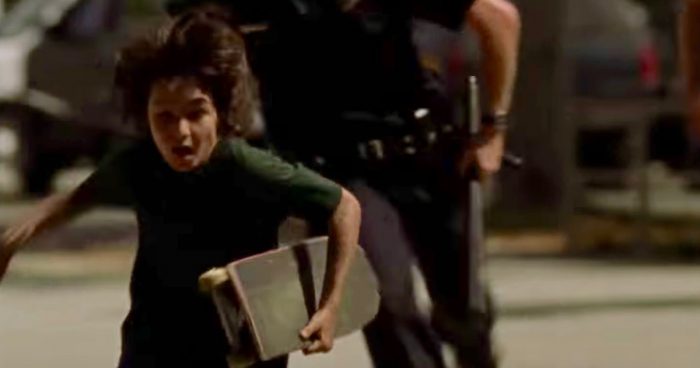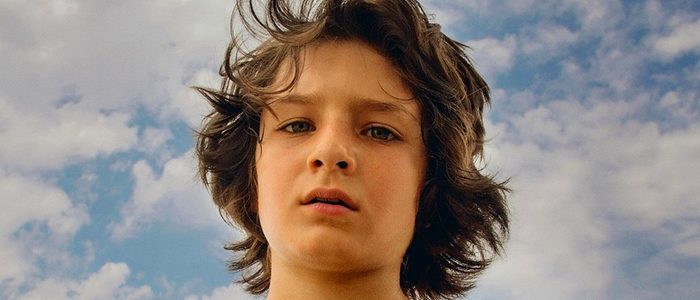‘Mid90s’ is a Coming-of-Age Classic That Replaces Nostalgia With Uncertainty [NYFF]

There’s something boyish about the trailer and title for Jonah Hill’s directorial debut; one might, from afar, call it juvenile. In an age where media has to hit familiar buttons just to be noticed, we’re inundated with nostalgia properties at every turn, so it wouldn’t be unreasonable to assume Mid90s is just another throwback. In some ways, it is. Hill fills the runtime with familiar, era-appropriate Hip Hop from wall to wall — A Tribe Called Quest, Cypress Hill, Big L, Wu-Tang and so on — resulting in an upbeat, contemplative mood evoked even further by composers Trent Reznor and Atticus Ross. And yet, what the film actually contemplates goes far beyond mere longing for a time and place. In fact, it hardly longs at all, opting instead to portray the more disquieting moments of boyhood, resulting (to my delight, and admittedly to my surprise) in one of the very best films of 2018. Between this and Don’t Worry, He Won’t Get Far on Foot, it’s the year of Jonah Hill.
If Mid90s is indeed a semi-autobiographical nostalgia vehicle, it’s a deeply selfless one. Hill, through a fearless performance from Sunny Suljic as Stevie, paints an honest portrait of the forces that govern carless youth, stepping back just enough to contextualize them from a wiser standpoint, though not so far that the film becomes a polemic on the past. In a pivotal scene in which Stevie tries to impress his new skater friends with a particularly risky jump, the film steps outside its ’90s soundscape for what feels like the only time, using Omega’s Gyöngyhajú lány (1969) as everything slows around Stevie. The part of the song that plays is the exact segment Kanye West’s samples on New Slaves from his 2013 album Yeezus (it wouldn’t be unreasonable to assume that’s where Hill first heard the song; he’s an avowed fan of Kanye’s music). Given the fate that befalls Stevie — don’t worry, he lives; the jump happens half way through the film — Hill’s narrative perspective is simultaneously one of peering into the past and of unpacking it in the present, perhaps even changing how he sees the past, not unlike the way Kanye samples music.
How characters and events appear in retrospect is a key element of Mid90s. Stevie’s aforementioned skater friends feel like something of an amorphous blob at first, visually introduced to us as a singular unit that Stevie observes from afar. Though as the film goes on and their individual lives begin to come to light, their placement and interactions within the seemingly shapeless group snap into place. The same is true for Stevie’s older brother Ian (A24 darling Lucas Hedges), a caricature of a violent older sibling who Hill frames as unnaturally towering over Stevie. His insecure hues come into focus as he and Stevie head towards one another bit by bit, both in the form of a collision course and a subsequent road to brotherly reconciliation — a silent, repressed reconciliation, that is; Mid90s is devastating in its depiction of young masculinity, eventually reducing Ian to a cowering mess in a corner of its frame.

Hill seems unable to situate Stevie at first. Whether by error or intent, it’s usually unclear where characters are sitting in relation to one another in the family scenes. Ian, Stevie and their mother Dabney (Katherine Waterston) are rarely given the luxury of establishing shots — Hill, like Stevie, has little interest in the shape of his L.A. hometown. The family is often introduced through uncomfortable dinner-time close ups with mismatched eye-lines that don’t even tell you who’s sitting on which side of the table, even as they converse. This visual disconnect continues whenever the three share the screen — Hedges even scowls at Waterston through a George H.W. Bush mask whose eyes don’t line up with his — a disorienting geographical (dis?)advantage of the 4:3 frame in a widescreen world. However, this disconnect is replaced by a definite directorial clarity whenever Stevie visits the local skate-shop and interacts with Ray (Na-kel Smith), Fuckshit (Olan Prenatt), Ruben (Gio Galicia) and Fourth Grade (Ryder McLaughlin), a mellow band of skaters of different ages and ethnicities. We’re always introduced to them from afar as Stevie calculates his approach, grinning ear-to-ear as he’s slowly inducted into a bizarre, made-up masculine hegemony (in which thanking someone is “gay”), learning the ways of the world from boys barely able to make sense of it themselves.
There’s a silent hierarchy to the group, one that’s semi-dependent on age (Ruben, the youngest until Stevie arrives, passes off waterboy duties to him) though on occasion, Stevie concludes that one’s position in the group depends on whether or not one has a nickname. Fourth Grade and Fuckshit do. Ray and Ruben don’t. Stevie doesn’t, at first. Then he does, “Sunburn,” which makes it all the more difficult for him to discern which members of the group to follow.
Continue Reading Mid90s >>
The post ‘Mid90s’ is a Coming-of-Age Classic That Replaces Nostalgia With Uncertainty [NYFF] appeared first on /Film.
from /Film https://ift.tt/2yqd4H1
No comments: